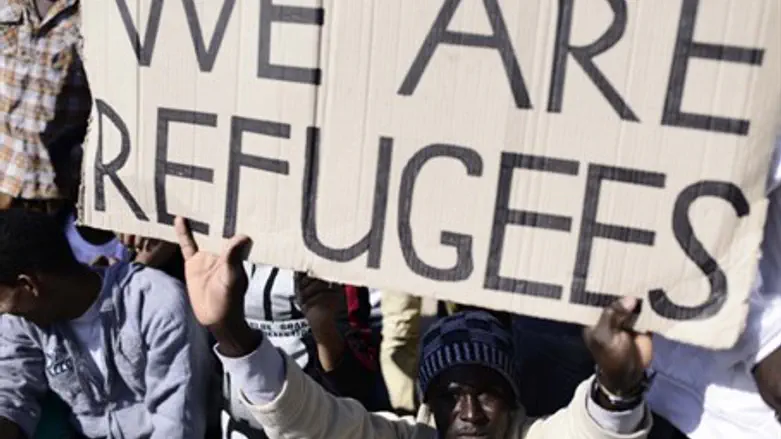
A major official legal expert slammed "human rights" and leftist groups for misleading the public regarding the true nature of Israel's infiltrator problem, giving facts and busting myths at an annual conference for the Bar Association in Eilat last week.
Yochi Genison, who is defined as the "primary [jurist] responsible for professional guidance to all lawyers [working in] immigration," is the most senior official at the State Attorney's office who deals with the sensitive issue.
And as Genison makes clear, Israel's steps to reduce the illegal immigration problem are justified; the migrants are not legitimate asylum-seekers.
"We need to understand the real story here," she stated. "This is not about refugees fleeing for their lives, but institutionalized smuggling networks."
"There has formed a complete industry based on human trafficking, smuggling humans living in Africa who seek to make a living in Europe and Israel," she continued. "And the vast majority of coming to Israel are not asylum seekers, but people who already found protection in Third World countries who choose to continue to work in Israel and settle there."
"We investigate the migrants and their stories and what we hear is the same: 'I went from X state to here after I thought, 'Wow, I got protection, but they told me I could, for $5,000, enter Israel," she added.
Genison maintained that while Israel is seeing a massive drop in the number of illegal immigrants entering Israel, this is not due to the border fence but because it has become less financially appealing to work in Israel. "Today, an infiltrator from Eritrea can not transfer the money legally to his country, and thus relatives cannot go and pay money smugglers with the cash," she said. "It is for this reason that the trend is diminishing."
The attorney emphasized, as well, that only migrant men are in danger of army recruitment in Eritrea and Sudan. Women and children face no danger if they are sent back to their home countries, she said.
"Eritrea has forced [army] recruitment," she said, "but this is true only for men and not for women."
"Thousands of women and children have entered Israel and there is no legal problem to return them," she stated. "The claim by [human rights] organizations that they are in danger is incorrect."
"Thousands of Sudanese who entered the State of Israel have left over the last eight months," she noted. "(Human rights organizations) demand that we grant them work visas and health insurance. But if we do, does this help asylum seekers establish themselves? The answer is no. On the contrary, today the networks are beginning to despair of Israel and are turning West toward Spain and Tunisia, just because the State of Israel is fighting the phenomenon."
Genison backed up her statement with cold, hard facts.
"Before 2007, Israel did not work to fight the phenomenon. At one point it gave 2,000 migrants work permits for hotels in Eilat," she explained. "As a result, the illegal immigration rate there increased threefold. There is a clear increase in the trend whenever the State of Israel grants more work permits [to illegal migrants]."
"By the way, according to the rules set down by the Holot Detention Facility [the Negev facility which provides full health, food, and education benefits for a limited time to illegal immigrants - ed.], every infiltrator who chooses to work at the facility can get close to 2,000 NIS ($500) per month - but the vast majority of people staying there choose not to work," she added. "Why? The big money is not there, but in Tel Aviv; when you work [illegally] in a restaurant or building there you can earn more and send money to your family, who will then [illegally] enter Israel on their own."
Most importantly, the official maintained, the majority of illegal infiltrators are not refugees.
"Of the tens of thousands of infiltrators [who have entered Israel], only 5,000 applied for asylum," she stated. "Only two Eritreans have ever received refugee status; it became clear that the rest are not eligible for the status [under international law]. They have no problem to leave the country. They can return to their country; if they do not say they were in Israel, they would have no danger in returning."
Illegal immigration - especially from Eritrea and Sudan - is a hotly debated topic in Israel.
Infiltrators are blamed for causing crime to skyrocket in southern Tel Aviv, where they constitute a majority of the population - and where violent crime is now several times more prevalentthan the average rate for the major city.
Residents of working-class neighborhoods say they have been suffering from endless harassment, fear and violence perpetrated by the many illegal Eritrean and Sudanese infiltrators who enter Israel to find employment and come to live in their neighborhoods.
A petition to expel the infiltrators initially reached the Court in December. However, controversy regarding new laws preventing illegal immigration - including a smear campaign against Israel's handling of the 60,000 migrants run by NGOs, leftist groups, and the UN - postponed judgement on the petition while Israel repaired damage to its image.